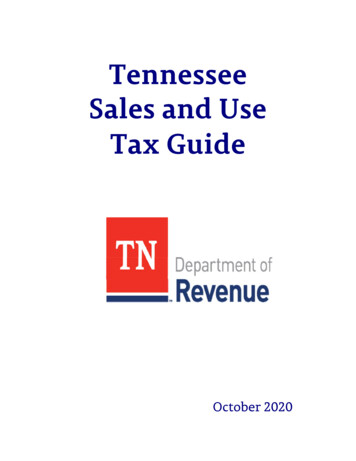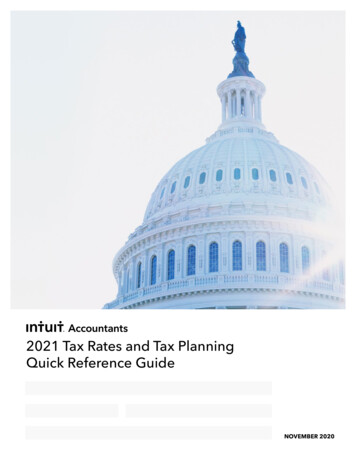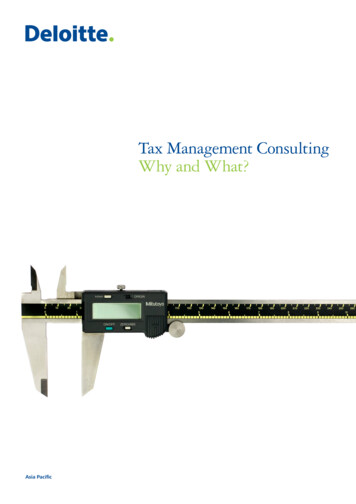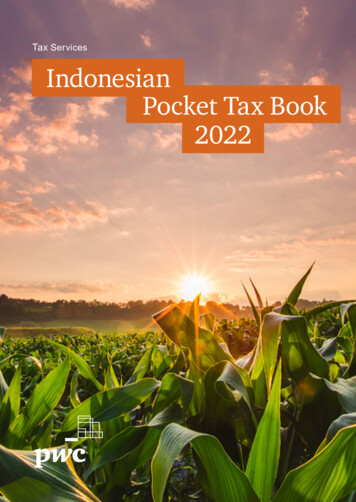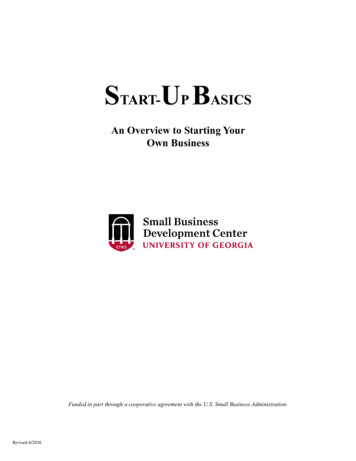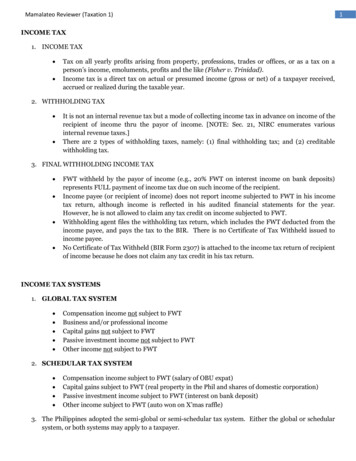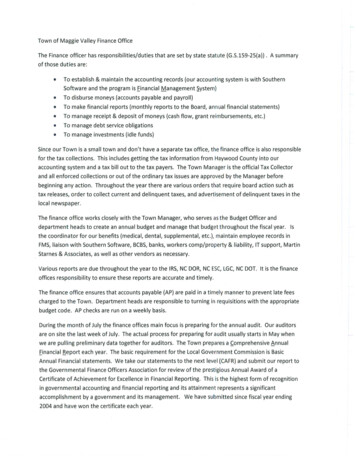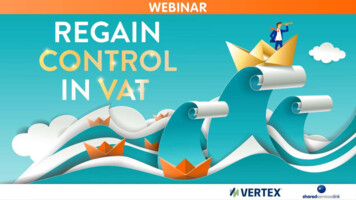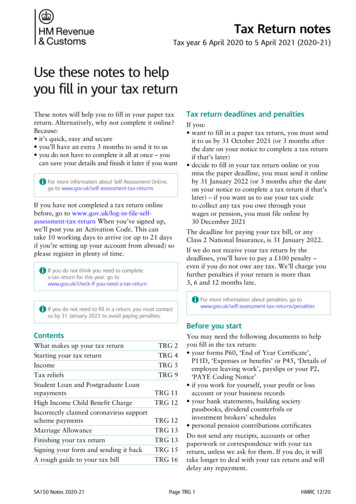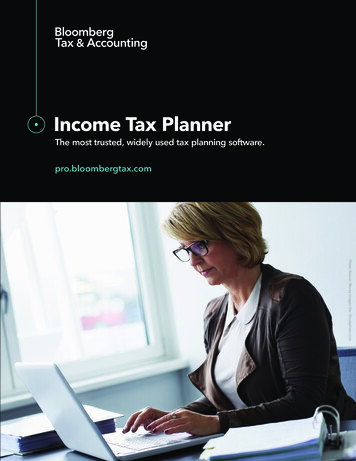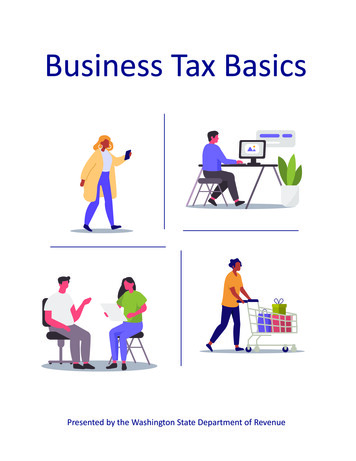
Transcription
Presented by the Washington State Department of Revenue
ContentsBusiness tax basics . . . . . . . . . . . . . . . . . . .1Personal property tax . . . . . . . . . . . . . . . . . 18Rights and responsibilities . . . . . . . . . . . . . . 2Unclaimed property . . . . . . . . . . . . . . . . . . 19Registering with the Department of Revenue . . 3Tax return payment and reporting . . . . . . . . 20Business and occupation (B&O) tax . . . . . . . . .4Small Business B&O Tax Credit . . . . . . . . . . . . . 4Retailing . . . . . . . . . . . . . . . . . . . . . . . . . . . 4Wholesaling . . . . . . . . . . . . . . . . . . . . . . . . . 5Reseller permit . . . . . . . . . . . . . . . . . . . . . . . 5Manufacturing . . . . . . . . . . . . . . . . . . . . . . . 6Service and other activities . . . . . . . . . . . . . . . 6Paying your taxes . . . . . . . . . . . . . . . . . . . . 20Due dates . . . . . . . . . . . . . . . . . . . . . . . . . 20Late penalties . . . . . . . . . . . . . . . . . . . . . . . 20Delinquent tax collection process . . . . . . . . . . 20Reporting no business activity . . . . . . . . . . . . 20Electronic filing (My DOR) . . . . . . . . . . . . . . . 22Setting up your My DOR access . . . . . . . . . . . 22Correcting a previously filed return . . . . . . . . . 23Retail sales tax . . . . . . . . . . . . . . . . . . . . . .7Will I be audited? . . . . . . . . . . . . . . . . . . . . . 24Definition of retail sales . . . . . . . . . . . . . . . . . 7What to expect during an audit . . . . . . . . . . . 24Collecting and reporting sales tax . . . . . . . . . . . 7Appeals process . . . . . . . . . . . . . . . . . . . . . 24Sales tax rates . . . . . . . . . . . . . . . . . . . . . . . . 8Special sales taxes . . . . . . . . . . . . . . . . . . . . . 8Local coding of retail sales . . . . . . . . . . . . . . . . 9Rental of tangible goods . . . . . . . . . . . . . . . . . 9Tools to determine sales tax rates and codes . . . . 9Deductions . . . . . . . . . . . . . . . . . . . . . . . 10Use tax . . . . . . . . . . . . . . . . . . . . . . . . . . 12Taxable amount and rates . . . . . . . . . . . . . . . 12Property used in a trade or business . . . . . . . . 12Use tax exemption . . . . . . . . . . . . . . . . . . . . 13Use tax credit . . . . . . . . . . . . . . . . . . . . . . . 13Report and pay use tax . . . . . . . . . . . . . . . . . 13Public utility tax . . . . . . . . . . . . . . . . . . . . 14Special taxes and fees . . . . . . . . . . . . . . . . 16Services and resources . . . . . . . . . . . . . . . . 25Other agencies to contact . . . . . . . . . . . . . 26Tax incentives . . . . . . . . . . . . . . . . . . . . . . 27Incentive programs: . . . . . . . . . . . . . . . . . . . 27Due dates . . . . . . . . . . . . . . . . . . . . . . . . 28Appendices . . . . . . . . . . . . . . . . . . . . . . . 29A Combined Excise Tax Return . . . . . . . . . . . 30B MATC Manufacturing Calculation Worksheet . 34C Sample reseller permit . . . . . . . . . . . . . . . 35D Confidential Tax Information Authorization . . 36E Common business activities table . . . . . . . . 37
This basic taxguide is createdto helpyou understandRevenuecollected(FY20)Washington’s tax structure. It’s intended to provide anoverview ofStatethe taxesthat(inapplyto various businessrevenuesbillions):Retail sales and use tax 12.1activities in Washington.Business and occupation 4.6Other local revenues desTaxandwhatit itprovides 12.1 b — State retail sales and use tax 5.4 b — Local retail sales and use tax 4.6 b — Business and occupation tax 3.9 b — Other state taxes and fees 3.6 b — State share property tax 0.4 b — Other local taxesWashington doesStatenot havea corporatepropertytax levy or personal 3.6state taxesincome tax. MostOtherWashingtonbusinesses are 3.9subjectLocalrevenues:to three major state taxes, all administered orRetail sales and use taxoverseen by the Departmentof Revenue: 5.4Business tax basicsBusiness tax basicsRevenue at a GlanceTotalandcollections1. Businessoccupation tax (B&O). 30.02. Retail Reporting/activesales tax.businesses 30Active reporting (as of 7/1/20):Monthly157,711Other taxes may applyto your business, suchas:Quarterly208,897Annual227,465 Public utility tax.Total594,073 Specialty taxes.Audits3,841 County andcity taxes.Voluntarycompliance98.2%3. Use tax.StaffingFTEsReminderBILLION1,197.9Human servicesState tax laws change regularly. The informationEfficienciesprovided is current at the time of the publication.Cost per 100 collected (FY20)66 In the past 20 years, we’ve increased:QuestionsRevenue collected135.1%Specialists are availableto answeryour tax questionsRegisteredbusinesses19.7%Monday throughFTEsFriday from 8 a.m. to 5 p.m.25.5%10.2 millionVisits to dor.wa.gov2.7 million(in millions):Filed returnsLive Chat: Go to dor.wa.gov,click Contact thenclickFY20 175.3FY21 186.6on the Live Chat icon. 361.9336,188ResourcesGo to dor.wa.gov, then click Get a Form or Publication. Industry-specific tax guides. Special notices. Tax topic articles.More servicesHealth carePublic safetyCustomer serviceAgency budget 2019-2021 biennialCall: 360-705-6705TotalNaturalresourcesEducationLICENSE 95%Returns filed online22,541Live chats 74 millionPhone callsUnclaimed propertyreturned to owners359,000172,751641.3 millionBusiness licenseapplications andrenewalsBusiness taxworkshops(732 attendees)Unclaimed propertyrefunds processedVisits toClaimYourCash.orgInformation on other services and publications canbe found at the back of this publication or on ourwebsite at dor.wa.gov.dor.wa.gov 360-705-67051
Rights and responsibilitiesRights and responsibilitiesYour rights as a taxpayer include: Written explanations when tax assessments,interest, and penalties are issued. Reliable, written advice and reporting instructionsprovided by the department specifically to thetaxpayer, and to have interest, penalties, andin some instances, tax assessments waived ifcomplying with that information worked againstthe taxpayer. Prompt administrative remedies when tax laws orrules are found to be unconstitutional by the finaldecision of a court of record. Confidentiality of their financial and businessinformation in the department’s possessionin accordance with the requirements of RCW82.32.330.Your responsibilities as a taxpayer include: Register with the Department of Revenue. Know their tax reporting obligations, and to askthe department for instructions when they areuncertain. Keep accurate and complete business records. File returns and pay taxes on time. Provide accurate information on tax returns. Substantiate claims for refund. Pay all taxes on time after closing a business, andrequest cancellation of the registration number. Respond to communications from the departmentin a timely manner. Clear and current tax instructions, rules,procedures, forms, and other tax informationreceived upon request. Prompt and independent administrative reviewby the department of a decision to revoke a taxregistration, and to a written determination thateither upholds the revocation or reinstates theregistration.Business records to keepYou should keep the following records for a minimumof five years: State excise tax returns and workpapers. Federal income tax returns. Summary accounting records and source journalssuch as the check register, general ledger, salesjournal, general journal, cash receipts journal, andany other records you use to record income andexpenses. Sales invoices. Purchase invoices. Depreciation schedules listing all assets acquiredor disposed of during the audit period along withpurchase or invoices for those assets. Reseller permits for any wholesale sales. Supporting documentation for all deductions andexemptions.2You may keep records in either paper or electronicformat. You must provide these records if requested bythe Department of Revenue.Accounting methodsAccrual accounting means that you record and reportrevenues when sales are made, even if you have not yetreceived payment.Cash accounting means that you record and reportrevenues when you receive payment from yourcustomers.You must report to the Department of Revenue usingthe same accounting method that you use to report tothe Internal Revenue Service.
Register if: Your business requires city and state endorsements. You are doing business using a name other than your full legal name. You plan to hire employees within the next 90 days. Your business is required to collect retail sales tax. Your gross income is 12,000 per year or more. Your business is required to pay taxes or fees to the Department of Revenue. You are a buyer or processor of specialty wood products. Your out-of-state business: Has physical presence nexus in Washington. Has more than 100,000 in combined gross receipts source or attributed to Washington.Registering with the Department of RevenueRegistering with the Department of Revenue Is organized or commercially domiciled in Washington.For any business type other than a sole proprietorship, you must first register with the Secretary ofState, and then register with the Department of Revenue.Also, see our requirements for Out-of-state businesses at inesses.You can register online at dor.wa.gov/open-business.Notesdor.wa.gov 360-705-67053
Business and occupation (B&O) taxBusiness and occupation (B&O) taxThe state business and occupation (B&O) tax is a grossreceipts tax measured on the value of products, grossproceeds of sales, or gross income of your business. TheB&O tax is your cost of doing business, and should notbe collected from your customers. Almost all businesseslocated or doing business in Washington are subject tothe B&O tax, including corporations, LLCs, partnerships,sole proprietors, and nonprofit corporations.The B&O tax is due on gross income from businessconducted in Washington. No deductions areallowed for labor, materials, taxes, or other costs ofdoing business. Your business may qualify for certainexemptions, deductions, and credits.There are more than 50 B&O tax classifications forbusiness activities. The B&O tax rate is based on thetype of business activity you engage in. Your businessmay report income under multiple tax classifications ifyou engage in more than one type of activity. You areresponsible for determining which classification(s) toreport your income under. Contact us if you are unsureof which classification(s) apply to your business.For the complete list of B&O tax classifications, visit dor.wa.gov and click Taxes & rates.Small Business B&O Tax CreditBusinesses below a certain B&O tax liability are entitledto a credit. The credit varies depending on the totalamount of B&O tax due. If you file your excise tax returnelectronically on My DOR, the Small Business B&O TaxCredit is calculated and applied automatically. If you fileyour excise taxes on a paper return, see our website fordetails about claiming this credit.Notes4RetailingBusinesses that sell goods and certain services toconsumers are retailers. Taxable retail services include:Improving real or personal property, such as: Custom construction. Repairs to real or personal property. Certain personal services, such as: Tanning. Use of athletic and fitness facilities. Recreational services. Tattooing. Specialized activities, such as: Lawn mowing, tree and shrub pruning, andtrimming. Escrow services. Renting equipment with operators. Extended warranties.Businesses making retail sales are subject to retailingB&O tax, even when the sales are not subject to retailsales tax. For example, certain food products areexempt from sales tax, but the income from food salesis subject to retailing B&O tax.
Business and occupation (B&O) taxWholesalingWholesalers sell goods and services to businesseswho will resell them to others in the regular course ofbusiness. The B&O tax is calculated on the wholesaleselling price. Retail sales tax is not collected onwholesale transactions. If you are a wholesaler,you must keep a reseller permit or other approvedexemption certificate on file from each buyer todocument the transaction as a wholesale sale. Do notsend reseller permits to the Department of Revenue.NotesReseller permitBusinesses buying goods or services for resale mustuse a reseller permit or other approved exemptioncertificate to make purchases without paying sales tax.Reseller permits may be used to buy: Merchandise and inventory for resale without thebuyer using it first. Ingredients, components, or chemicals used inprocessing new products for sale. Feed, seed, seedlings, fertilizer, and spray materialsif you are a farmer. Materials and contract labor for retail/wholesaleconstruction. Items for dual purposes.Reseller permits may not be used to buy: Items for personal or household use. Items used in a business that are not resold, such asoffice supplies and equipment. Promotional items or gifts. Tools, equipment, or equipment rentals. Materials and contract labor for public roadconstruction, federal government contracting, orspeculative building.Verify customers’ reseller permitsWe recommend that at least once per year you verifythat your customers’ reseller permits are valid.For a single permit, use our Business Lookup at dor.wa.gov/businesslookup and print a copy for yourrecords.For multiple permits, use our Reseller Permit VerificationService at dor.wa.gov/ResellerPermitVerificationServiceand keep the confirmation code(s) for your records.dor.wa.gov 360-705-67055
Business and occupation (B&O) taxManufacturingCompanies that manufacture items in Washington paythe manufacturing B&O tax. Manufactured productsused by the manufacturer are also subject to this tax.The manufacturing B&O tax is based on the value of theproducts, usually determined by the selling price. Incases when there is no sale, the value is the selling priceof similar products.The producer must also report under the wholesalingor retailing B&O tax. However, the Multiple Activities TaxCredit eliminates the lesser of the production or sellingtaxes.Service and other activitiesThe service and other activities B&O tax is due on salesof personal and professional services. Any businessactivity that is not subject to another B&O tax mustreport under this “catch all” category. The types ofbusinesses and services that report under this categoryinclude: Consulting services. Management services. Attorneys. Beauticians. Doctors. Tutors. Janitors.This tax classification has two rates. The rate you payis based on the total income earned in the previousyear. If a business and its affiliates earned more than 1million subject to service and other activities B&O taxin the previous year, then they pay the higher serviceand other activities rate. If a businesses and its affiliatesearned less than 1 million subject to service and otheractivities B&O tax in the previous year, then they paythe lower service and other activities rate.6Notes
The retail sales tax, often referred to simply as sales tax,is Washington’s largest tax source.All sales tax amounts collected from customers areconsidered trust funds of the state. The retailer holdsthese amounts until paid to the Department ofRevenue.Retail sales taxRetail sales taxNotesDefinition of retail salesUnless specifically exempted by law, every sale oftangible personal property, digital goods, and digitalcodes is a retail sale. In addition, sales of certain servicessuch as installing, improving, or constructing real orpersonal property for consumers are also retail sales.Certain services are specifically defined as retail sales inthe law, such as: Transient lodging. Automobile parking. Title insurance. Escrow services. Extended warranties. Use of athletic or fitness facilitiesCollecting and reporting sales taxRetail sales tax applies to the selling price of taxabletransactions and must be separately stated on the billto the customer. The selling price includes shipping anddelivery charges. The advertised price may include theamount of tax, if so indicated in the advertisement.Tax liability must be reported for all sales made duringthe reporting period on either the accrual basis or cashbasis of accounting. Sellers are liable for submitting thecorrect amount of sales tax, even if they did not collectthe proper amount from the purchaser.All amounts collected are legally considered trust fundsfor the state. Any excess sales tax collected from thecustomer must be paid to the Department of Revenueunless the over-collected amount is refunded to thecustomer.dor.wa.gov 360-705-67057
Retail sales taxSales tax ratesThe sales tax rate you charge to your customer includesboth the state portion (6.5%) and the local portion (ratevaries by location). Local sales tax is the second-largestrevenue generator for local governments, behindproperty tax. Retail sales tax is used by the governmententity that imposes the tax. The state tax is depositedin the state general fund, while the city and countytaxes are distributed to the local governments. The cityand county governments use these taxes for generalexpenditures.Special sales taxesMotor vehicle sales/use taxAn additional 0.3% tax due on sales, leases, andtransfers of motor vehicles licensed for on-road use. Thistax does not apply to retail car rentals that are subjectto the rental car tax.Rental car taxPaid by the consumer on the rental of a passenger carfor a period less than 30 days in addition to sales tax.Convention and trade center taxAdditional tax is charged by hotels/motels located inKing County. Convention and trade center tax locationcodes are found in the Lodging Information Rates andChanges flyer, available at dor.wa.gov.Special hotel/motel taxSome areas levy an additional tax for transient rentals(less than 30 consecutive days) of hotel/motels, RVparks, or any other type of lodging. Special hotel/motellocation codes are found in the Lodging InformationRates and Changes flyer, available at dor.wa.gov.8Notes
Tools to determine sales tax rates and codesYou must report your total retail sales by location codefor each place of sale so local sales tax revenues areaccurately distributed to cities and counties.We have several tools available to assist you withdetermining the correct local tax rates:Sales of tangible goods, digital goods, and digital codesare coded to the location where the customer receivesthe item. Usually, the location of the business is wherethe customer receives tangible goods. If an item isshipped or delivered, then the sale is coded to thelocation where it is shipped or delivered to. For sales ofdigital goods and digital codes the location is usuallythe address of the buyer.Labor and services are coded according to where theyare primarily performed. If an installation charge isnormally added to the cost of an item, the entire chargefor that item is coded to the site where it is installed. Mobile app for iOs and Android devices, free todownload from the Apple App Store or GooglePlay. Tax rate lookup on our website, searches accordingto address, map lookup, or latitude and longitude. Local sales and use tax rates and changes flyer onour website, lists local rates alphabetically by city/county.Visit dor.wa.gov/salesandusetaxtools for more options.Free mobile appfor iOs and Androiddevices.Certain sales are coded to the location of the sellerregardless of where the customer receives the good,such as vehicles, boats, and floral arrangements.Rental of tangible goodsThe local sales tax rate for the lease or rental of tangiblegoods depends upon the number of lease or rentalpayments.Retail sales taxLocal coding of retail salesWA Sales TaxNotesSingle paymentIf a lease or rental of tangible goods is paid with a singlepayment, then the location of the rental companydetermines the local sales tax rate.Periodic paymentsIf a lease or rental of tangible goods is paid with multiplepayments, the first payment is coded to the location ofthe rental company. All subsequent payments are codedto the location where the rental item is primarily locatedor stored.dor.wa.gov 360-705-67059
DeductionsDeductionsSome deductions are valid for B&O tax only, some are valid for retail sales tax only, and some are valid for both.The most common deductions are listed below. For a full list of available deductions, please see our website. Thefollowing deductions must be included in your gross income on the excise tax return and then subtracted as adeduction:Deductions for B&O tax onlyDeductions for retail sales tax onlyCasual salesAs a registered business, you are required to collectretail sales tax on all retail sales of goods. If you makesales of goods outside the regular course of yourbusiness, you may claim a deduction under the retailingB&O tax classification. Documentation includes thesales invoice.Exempt food salesFood and food ingredients must meet specific criteria(WAC 458 20 244). Documentation includes the salesinvoice.Deductions for both B&O tax and retail salestaxBad debtsDeductible when written off in accounting records(e.g. deductible for federal income tax purposes) andreported on a previous tax return. Documentation forthis deduction includes the sales invoice, proof that theoriginal sale was reported on the excise tax return, andproof that the debt was written off.Interstate and foreign salesShipped or delivered to your customer outsideWashington. Documentation for this deductionincludes the sales invoice and shipping document.Returns and allowancesFor sales reported in full on a previous tax return,but later returned and refunded to the customer.Documentation includes the original sales invoice,proof that the full sale amount was reported on aprevious return, and the credit memo.Retail sales tax collected by facilitatorMarketplace sellers may claim this deduction when amarketplace facilitator collects and pays Washingtonretail sales tax on their behalf. Documentation includesproof the facilitator is collecting sales tax on behalfof the seller, which is usually included in the contractbetween the two parties.Sales to enrolled tribal members with delivery on thereservationSales to enrolled tribal members where the goods aredelivered to the tribal member on their reservation ortrust land. Documentation includes the sales invoiceand completed tribal form.Sales to the U.S. GovernmentPurchased with U.S. Government funds; does notinclude sales to federal employees. Documentation forthis deduction includes the sales invoice and proof ofpayment from the U.S. Government.Taxable amount for tax paid at sourceThe amount paid for goods that were later resoldwithout intervening use, where retail sales tax was paidat the time of purchase. Documentation includes thepurchase invoice and sales invoice.Trade-in allowanceFor exchanges of like-kind goods. Documentationincludes the sales invoice showing the item sold andthe item taken on trade.10
DeductionsNotesdor.wa.gov 360-705-670511
Use taxUse taxMany people don’t realize there are Washingtontax obligations for goods and certain retail servicespurchased or acquired when sales tax was not paid. Forinstance, even though you don’t pay sales tax whenyou shop in Oregon, your purchases are subject to usetax when you bring them into Washington.Washington citizens also owe use tax in this state whenthey purchase items in other states that have a sales taxrate lower than Washington’s. However, a credit mayavailable for sales or use tax paid to other states.There are many instances when Washington’s sales taxis not paid on purchases. In most of these situations,use tax is due. Unless specifically exempted, goodsused in this state are subject to either sales tax or usetax, but not both. The tax applies regardless of where,or from whom, the property is purchased.Taxable amount and ratesThe use tax rates are the same as the sales tax rates. Youcan find them at dor.wa.gov.Use tax is due at the rate applicable to the locationwhere you first use the article. The state portion of thetax is 6.5% with local governments imposing their ownadditional use tax.Use tax is calculated on the value of the goods whenfirst used in Washington, which is generally thepurchase price. Fair market value may be used if thegoods are used outside the state for a lengthy periodof time before being used in Washington by the sameperson.The value of the goods includes shipping, delivery, andinstallation charges.Here are examples of situations when use tax is due: Goods purchased from out of state by subscription,through the Internet, or from a mail order catalogcompany when the company doesn’t collectWashington sales or use tax. Goods purchased from someone not required tocollect sales tax. For example, when you purchasefurniture or appliances from an individual througha newspaper classified ad or a garage sale. Personal property acquired with the purchase ofreal property. Machinery and equipment usedin a manufacturing process may qualify for theManufacturer’s sales/use tax exemption.Property used in a trade or businessUse tax is due when goods are purchased forconsumption or used by a business and sales tax hasnot been paid. Some examples of goods that might bepurchased without sales tax include: Supplies, fixtures, and equipment purchased orleased from an out-of-state vendor. Supplies, fixtures, and equipment acquired whenan existing business is purchased. Promotional items, such as hats, t-shirts, calendars,pens, and other items given to customers orindividuals. Magazine subscriptions. Advertising or promotional materials printed out ofstate and distributed in Washington. Parts installed and labor performed on tangiblepersonal property repaired out of state. Materials installed when performing contracts forthe federal government or city/county housingauthorities, or public road construction. Equipment rented by a contractor on which salestax was not previously paid. Articles withdrawn from inventory and used by thebusiness. Articles manufactured by the business for its ownuse.12
Use taxUse tax exemptionUse tax creditResidents of another state who move to Washingtonare exempt from the use tax on their household goods,personal effects, and private motor vehicles, if theyacquired the property more than 90 days prior to themove.When you bring goods into Washington that youpurchased in another state and paid sales tax atthe time of purchase, you can deduct the sales oruse tax you paid from the amount of use tax due toWashington. You must provide proof that the propertywas purchased or first used outside of Washington.For this exemption, boats, motorhomes, trailers, andother recreational vehicles don’t qualify as privatemotor vehicles or personal effects and are subject touse tax. However, a credit is allowed for sales/use taxpaid on the article. You must provide proof of sales/usetax previously paid to qualify for the credit.When items are donated to nonprofit charitableorganizations, local governments, and the state, the usetax isn’t due even if the donor didn’t originally pay salestax or use tax on the item. The donor is also exemptfrom the use tax as long as they didn’t use the itemprior to donation.See WAC 458 20 178 and RCW 82.12 for moreinformation about use tax.Report and pay use taxRegistered businesses must report use tax on theexcise tax return. Individuals must report use tax tothe Department of Revenue on the consumer use taxreturn.Notesdor.wa.gov 360-705-670513
Public utility taxPublic utility taxInstead of B&O tax, the public utility tax applies if you engage in any of the following activities in Washington:Hauling for hireOther utilitiesMotor transportation: operating any motor propelledvehicle on public roads to transport property belongingto others or people on a for-hire basis.Gas distribution: operating a plant or system forthe producing or distributing of natural and/ormanufactured gas for hire or sale.Urban transportation: operating any motor propelledvehicle on public roads to transport property belongingto others or people on a for-hire basis when the originand destination of the haul are within any of thefollowing: The corporate limits of the same city. Five miles of the corporate limits of the same city. Five miles of the corporate limits of any two citieswhose corporate limits are no more than five milesapart. Mileage is determined by the straight line distance,rather than road miles.Log transportation: the business of transporting logsby truck, except when the transportation either: Meets the definition of urban transportation. Occurs only on private roads. Income from transporting logs on private roads issubject to service and other activities B&O tax.Power: operating a plant or system for generating,producing, or distributing of electrical energy for hire orsale.Railroad: operating any railroad or carrying property forpublic hire on the line of any common carrier operatedin Washington.Railroad car: rental, lease, or operation of cars used fortransportation of property or persons upon the line ofany railroad operated in Washington when t
Business and occupation (B&O) tax Notes Business and occupation (B&O) tax The state business and occupation (B&O) tax is a gross receipts tax measured on the value of products, gross proceeds of sales, or gross income of your business . The B&O tax is your cost of doing business, and should not be collected from your customers . Almost all .
